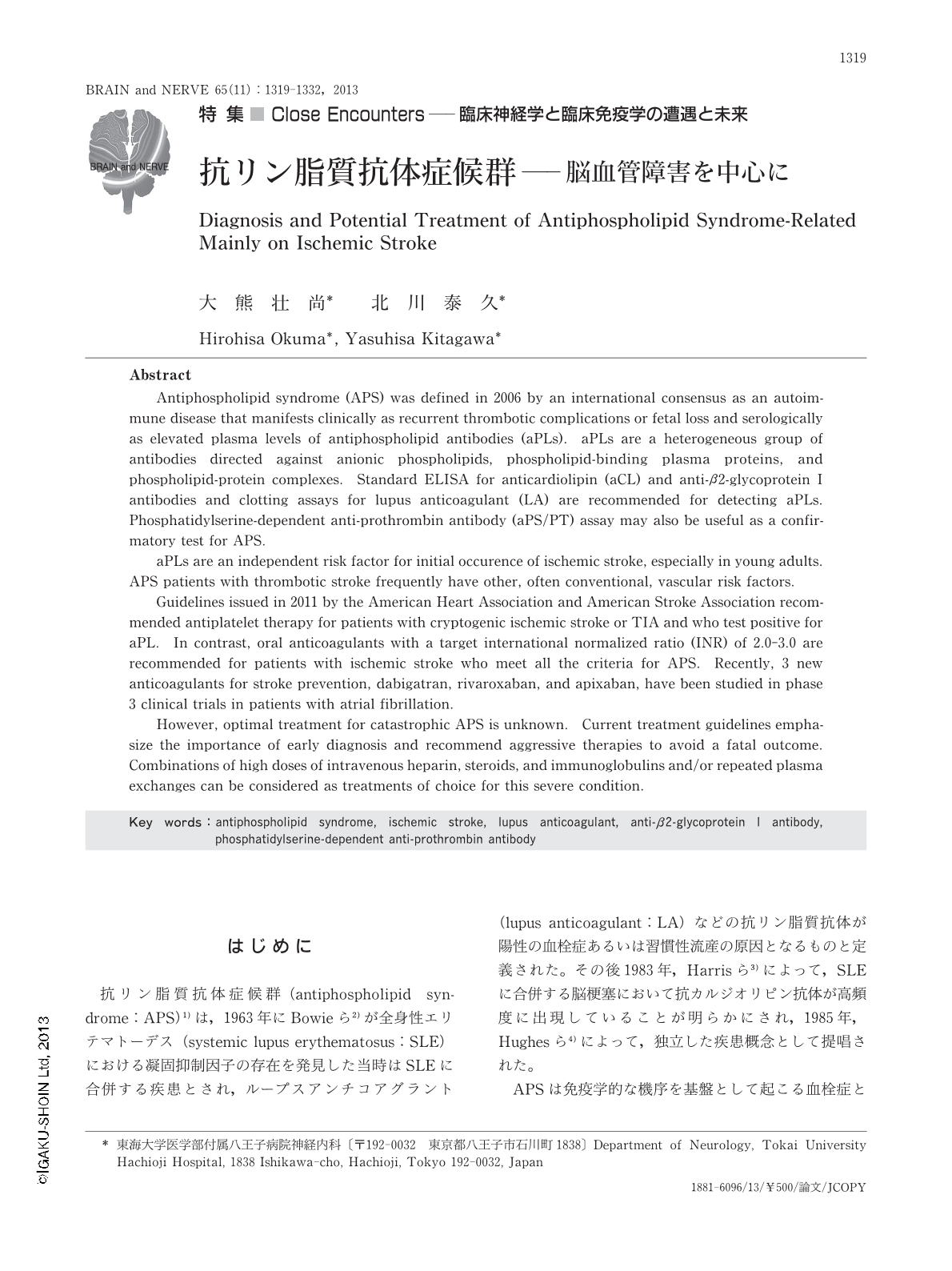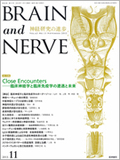Japanese
English
- 有料閲覧
- Abstract 文献概要
- 1ページ目 Look Inside
- 参考文献 Reference
はじめに
抗リン脂質抗体症候群(antiphospholipid syndrome:APS)1)は,1963年にBowieら2)が全身性エリテマトーデス(systemic lupus erythematosus:SLE)における凝固抑制因子の存在を発見した当時はSLEに合併する疾患とされ,ループスアンチコアグラント(lupus anticoagulant:LA)などの抗リン脂質抗体が陽性の血栓症あるいは習慣性流産の原因となるものと定義された。その後1983年,Harrisら3)によって,SLEに合併する脳梗塞において抗カルジオリピン抗体が高頻度に出現していることが明らかにされ,1985年,Hughesら4)によって,独立した疾患概念として提唱された。
APSは免疫学的な機序を基盤として起こる血栓症として重要で,特に若年性脳梗塞の発症5)や,多臓器の動・静脈血栓症,習慣性流産などに関与し,多彩な臨床像を呈する後天的な凝固異常症である。1998年,札幌で開かれたAPSのシンポジウムでその分類診断基準が提唱され6),2006年に札幌クライテリア・シドニー改変7)としてAPSにおける診断基準が改訂され(Table1),本症候群と脳血管障害の関連についての研究も進められている。最近では,高血圧症の頻度が高く,中枢神経症状が主体となる特殊型として,劇症型(catastrophic)APS8)も注目されている。
Abstract
Antiphospholipid syndrome (APS) was defined in 2006 by an international consensus as an autoimmune disease that manifests clinically as recurrent thrombotic complications or fetal loss and serologically as elevated plasma levels of antiphospholipid antibodies (aPLs). aPLs are a heterogeneous group of antibodies directed against anionic phospholipids, phospholipid-binding plasma proteins, and phospholipid-protein complexes. Standard ELISA for anticardiolipin (aCL) and anti-β2-glycoprotein I antibodies and clotting assays for lupus anticoagulant (LA) are recommended for detecting aPLs. Phosphatidylserine-dependent anti-prothrombin antibody (aPS/PT) assay may also be useful as a confirmatory test for APS.
aPLs are an independent risk factor for initial occurence of ischemic stroke, especially in young adults. APS patients with thrombotic stroke frequently have other, often conventional, vascular risk factors.
Guidelines issued in 2011 by the American Heart Association and American Stroke Association recommended antiplatelet therapy for patients with cryptogenic ischemic stroke or TIA and who test positive for aPL. In contrast, oral anticoagulants with a target international normalized ratio (INR) of 2.0-3.0 are recommended for patients with ischemic stroke who meet all the criteria for APS. Recently, 3 new anticoagulants for stroke prevention, dabigatran, rivaroxaban, and apixaban, have been studied in phase 3 clinical trials in patients with atrial fibrillation.
However, optimal treatment for catastrophic APS is unknown. Current treatment guidelines emphasize the importance of early diagnosis and recommend aggressive therapies to avoid a fatal outcome. Combinations of high doses of intravenous heparin, steroids, and immunoglobulins and/or repeated plasma exchanges can be considered as treatments of choice for this severe condition.

Copyright © 2013, Igaku-Shoin Ltd. All rights reserved.


